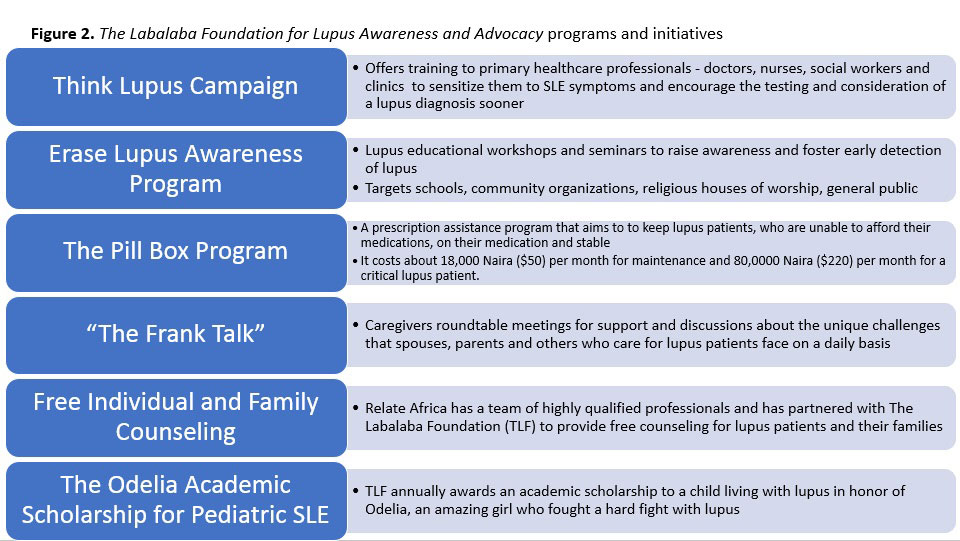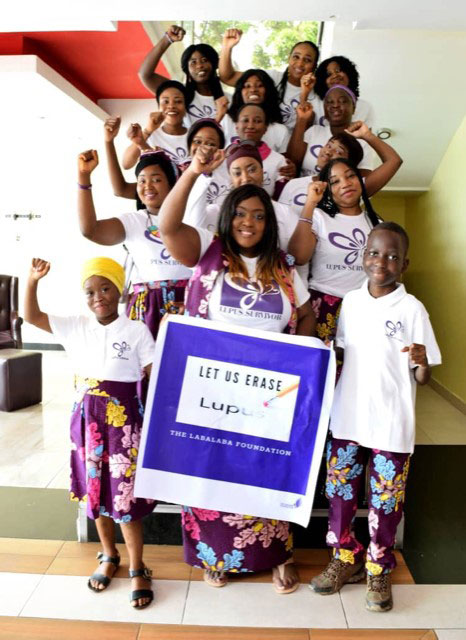Session Information
Session Type: Poster Session (Sunday)
Session Time: 11:30AM-1:30PM
Background/Purpose: After having my youngest son in 1994, I developed discomfort in my fingers which I ignored. In 1997, I had pericarditis, and two years later, pleurisy. I was diagnosed with lupus at the Cleveland Hospital in Florida about 20 years ago, 4-5 years after my initial symptoms. My initial treatment was inconsistent, because I lived 4 hours away from the healthcare facility, and I did not have adequate health insurance. At this time, my symptoms were frequent fevers, weight loss, abdominal pain, and generalized myalgias. I took acetaminophen or naproxen and medicines like Zantac for the abdominal pain.
Treatment: I moved to Boston in 2008 and I started a consistent treatment regimen: prednisone, hydroxychloroquine, omeprazole, azathioprine, lisinopril, nifedipine. My disease also progressed. I experienced increased myalgias and developed blood clots and pulmonary hypertension. I continued to experience pericarditis and pleurisy. I was switched from azathioprine to mycophenolate mofetil, and warfarin and gabapentin were added. Abatacept was tried for my joints but I developed a rash. I was switched to belimumab.. Finding the right cocktail of drugs required the masterful skill of my healthcare team to move me from barely surviving with lupus, and now, well on the way to thriving despite lupus.
Maintenance: After setbacks to my health between 2008-2015 (falls, increased pain, hospitalizations, difficulty coping, and having to stop work) I began to improve. I earned my master’s degree and started a consulting practice. I became active again with my Christian ministry and my stress level lessened, which seemed to be tied to reduced lupus activity. As a woman of Nigerian descent, it occurred to me that I had never met another Nigerian living with lupus. If lupus is prevalent in people of African descent in the US then it must be present in Africa and in Nigeria, the most populous African nation. I embarked on a fact finding trip and then started The Labalaba Foundation for Lupus Awareness and Advocacy in Nigeria. I also began to participate in Boston-based research studies and became a member of the Patient Advisory Board of the largest lupus center in New England.
Quality of Life: My quality of life has drastically improved over the past three years. I am more active at home, I have socially re-engaged, I go shopping, and I travel. For many years I was unable to do this. Most amazing is that I am now a lupus advocate, educator and champion. Since I began helping lupus patients I have not been hospitalized. Lupus is a complex disease and the complexity goes beyond the clinical symptomatic manifestations. Each lupus manifestation is influenced by a patient’s social circumstances and access to good medical care. The health and wellbeing of lupus patients may improve when definite steps are taken to address stress factors and other lifestyle triggers. Through my own journey and the creation of The Labalaba Foundation, I have taken charge of my health and hope to help others do the same.
Disclosure: C. Nosamiefan, None; C. Phillip, None; C. Feldman, None.
To cite this abstract in AMA style:
Nosamiefan C, Phillip C, Feldman C. From Diagnosis to the Establishment of the Labalaba Foundation: My Journey from Surviving to Thriving [abstract]. Arthritis Rheumatol. 2019; 71 (suppl 10). https://acrabstracts.org/abstract/from-diagnosis-to-the-establishment-of-the-labalaba-foundation-my-journey-from-surviving-to-thriving/. Accessed .« Back to 2019 ACR/ARP Annual Meeting
ACR Meeting Abstracts - https://acrabstracts.org/abstract/from-diagnosis-to-the-establishment-of-the-labalaba-foundation-my-journey-from-surviving-to-thriving/



